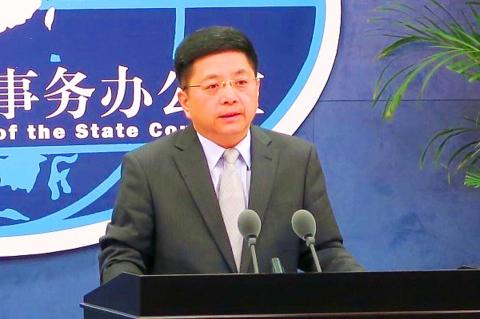China’s Taiwan Affairs Office spokesman Ma Xiaoguang (馬曉光) yesterday praised Kaohsiung mayor-elect Han Kuo-yu’s (韓國瑜) acceptance of the so-called “1992 consensus,” calling it imperative for Taiwan’s well-being.
Speaking at a news conference in Beijing, Ma emphasized city-to-city interactions rather than relations between central governments, saying he welcomed cross-strait exchanges on the basis of “proper understanding.”
The exchanges would promote “mutual love and well-being for compatriots on both sides of the Taiwan Strait,” he said.

Photo: CNA
The peaceful development of cross-strait relations would bring both sides concrete benefits, which would include economic, cultural and other types of exchanges, he said.
Ma said Kaohsiung was already beginning to see the benefits of good cross-strait ties, citing the relaunch of Chinese group tour visits to the city on Tuesday.
Ma accused the Democratic Progressive Party (DPP) of “obstructing good cross-straight relations for years, to the detriment of Taiwanese.”
The earlier the obstructions were “introduced by the DPP,” the greater the effect they have had on “Taiwanese compatriots,” he said.
The Chinese Communist Party hopes that the livelihood of Taiwanese would be improved more easily through economic development, he said.
In July, Taichung lost the right to host the first East Asian Youth Games, originally set to be held in August next year, due to pressure from China.
Taichung mayor-elect Lu Shiow-yen (盧秀燕), who also acknowledges the “1992 consensus,” said she would endeavor to have the Games reinstated.
Local media have raised the question of whether China would agree to the city hosting the Games, now that a referendum to change the national team’s name from “Chinese Taipei” to “Taiwan” was rejected on Saturday.
China had originally objected to Taichung hosting the Games on the basis that Taiwanese groups were calling for the name change.
“The failure of the referendum shows that gambling with the rights of athletes will not receive popular support and shows that moves toward Taiwanese independence are doomed to fail,” Ma said.
Ma said the decision to reinstate the city’s right to host the Games ultimately rests with the East Asian Olympic Committee.
The “1992 consensus,” a term former Mainland Affairs Council chairman Su Chi (蘇起) admitted making up in 2000, refers to a tacit understanding between the Chinese Nationalist Party (KMT) and the Chinese government that both sides of the Taiwan Strait acknowledge that there is “one China,” with each side having its own interpretation of what “China” means.

Costa Rica sent a group of intelligence officials to Taiwan for a short-term training program, the first time the Central American country has done so since the countries ended official diplomatic relations in 2007, a Costa Rican media outlet reported last week. Five officials from the Costa Rican Directorate of Intelligence and Security last month spent 23 days in Taipei undergoing a series of training sessions focused on national security, La Nacion reported on Friday, quoting unnamed sources. The Costa Rican government has not confirmed the report. The Chinese embassy in Costa Rica protested the news, saying in a statement issued the same

Taiwan’s Liu Ming-i, right, who also goes by the name Ray Liu, poses with a Chinese Taipei flag after winning the gold medal in the men’s physique 170cm competition at the International Fitness and Bodybuilding Federation Asian Championship in Ajman, United Arab Emirates, yesterday.

A year-long renovation of Taipei’s Bangka Park (艋舺公園) began yesterday, as city workers fenced off the site and cleared out belongings left by homeless residents who had been living there. Despite protests from displaced residents, a city official defended the government’s relocation efforts, saying transitional housing has been offered. The renovation of the park in Taipei’s Wanhua District (萬華), near Longshan Temple (龍山寺), began at 9am yesterday, as about 20 homeless people packed their belongings and left after being asked to move by city personnel. Among them was a 90-year-old woman surnamed Wang (王), who last week said that she had no plans

TO BE APPEALED: The environment ministry said coal reduction goals had to be reached within two months, which was against the principle of legitimate expectation The Taipei High Administrative Court on Thursday ruled in favor of the Taichung Environmental Protection Bureau in its administrative litigation against the Ministry of Environment for the rescission of a NT$18 million fine (US$609,570) imposed by the bureau on the Taichung Power Plant in 2019 for alleged excess coal power generation. The bureau in November 2019 revised what it said was a “slip of the pen” in the text of the operating permit granted to the plant — which is run by Taiwan Power Co (Taipower) — in October 2017. The permit originally read: “reduce coal use by 40 percent from Jan.